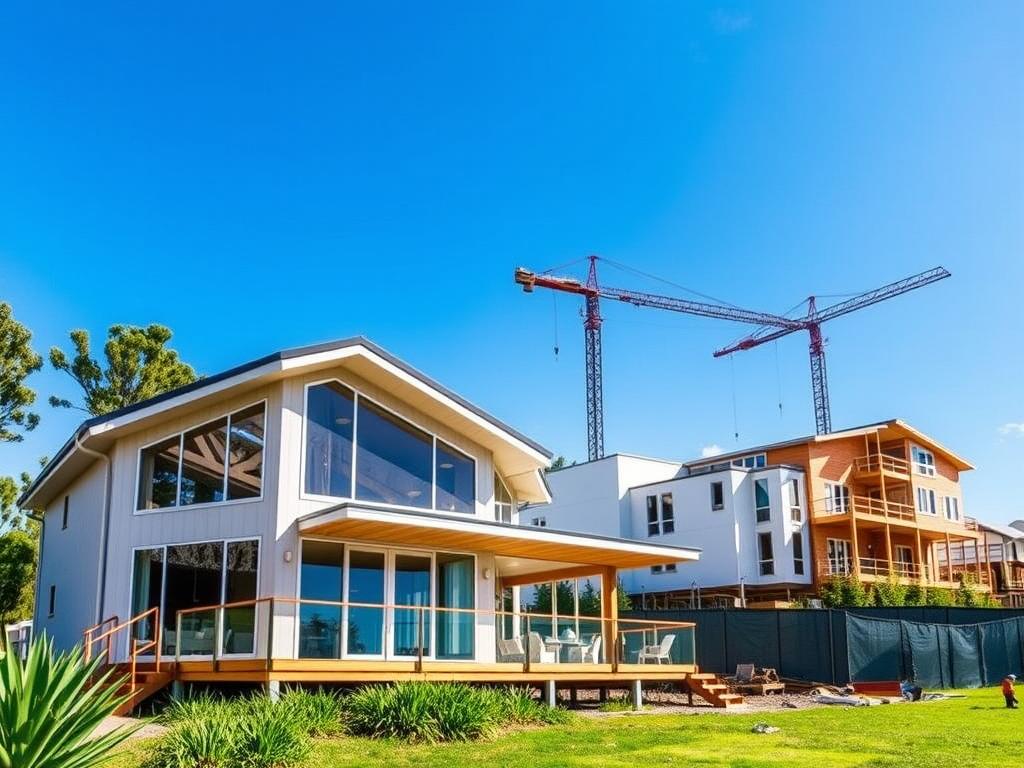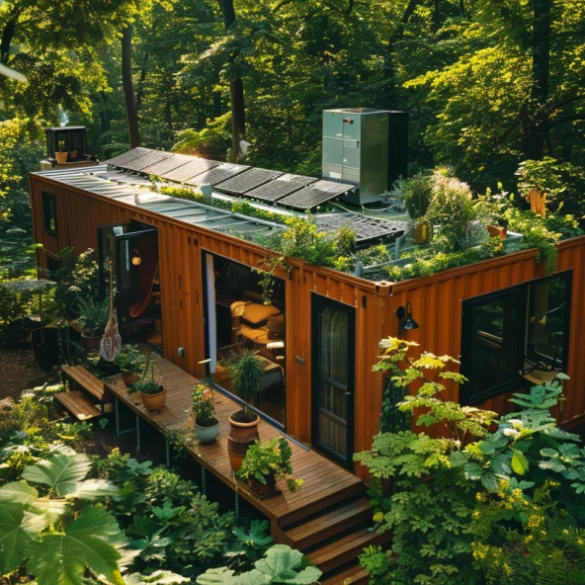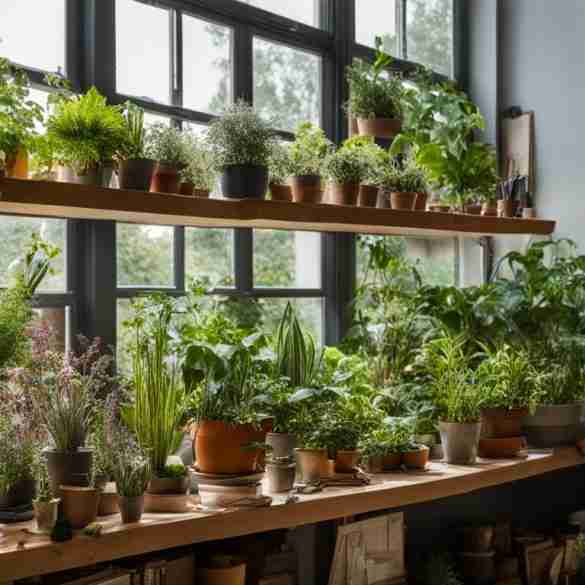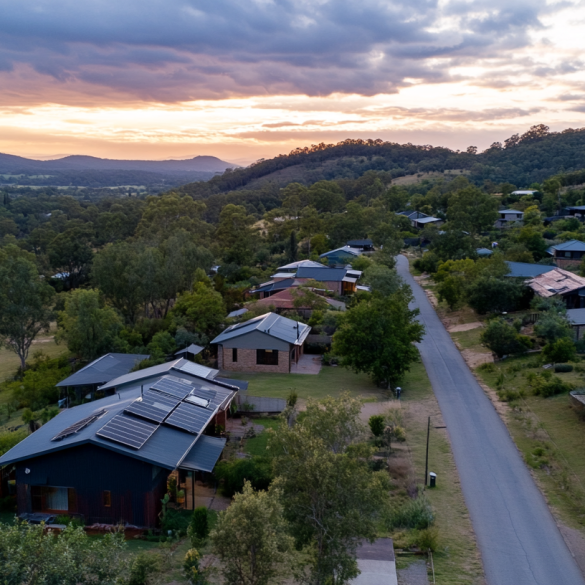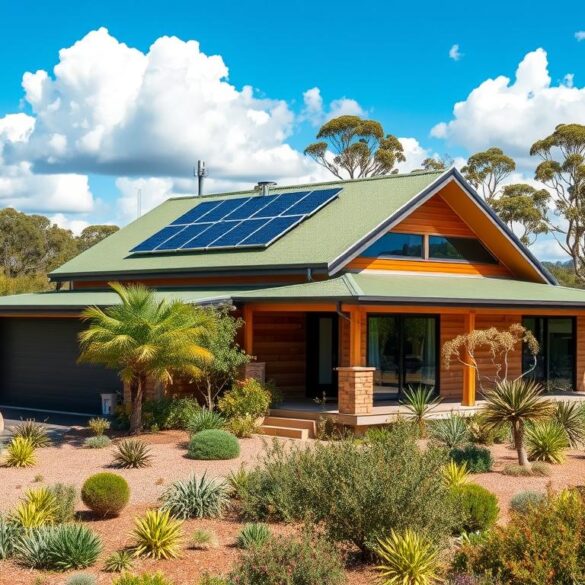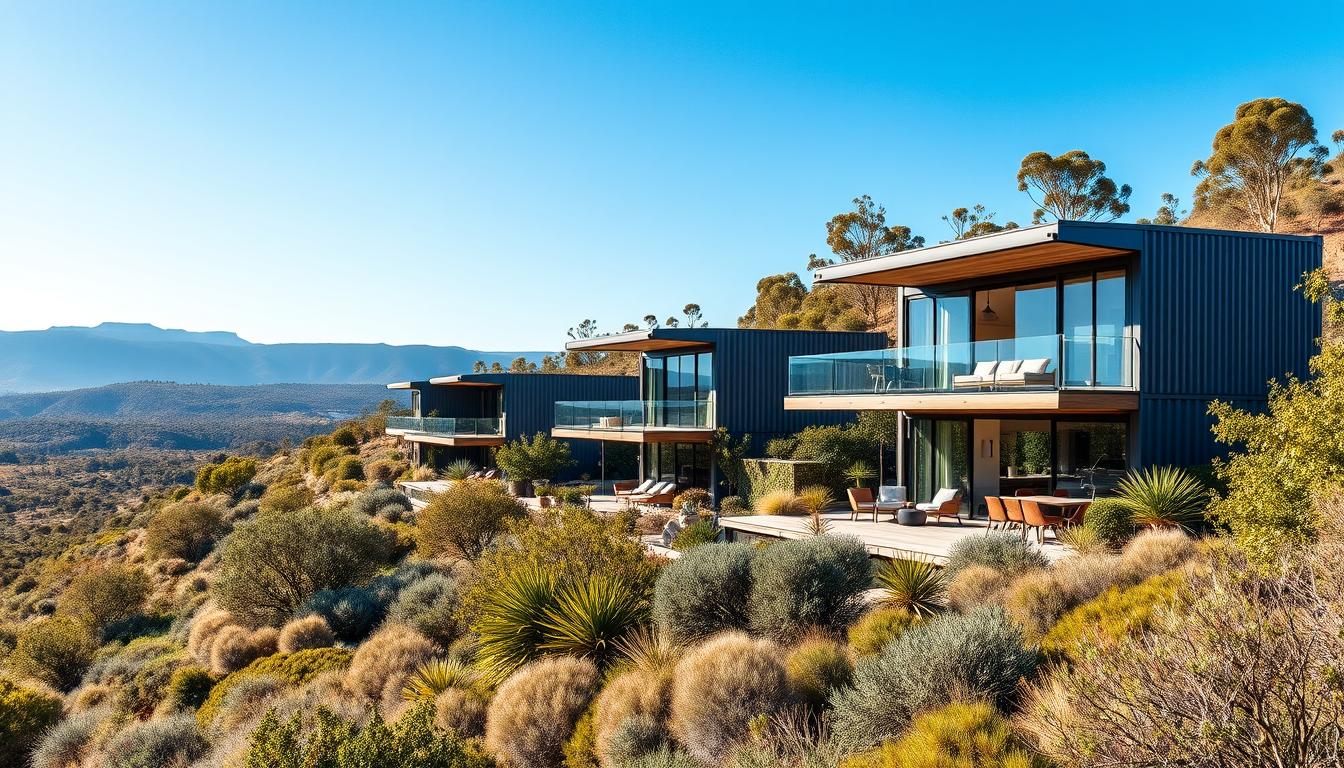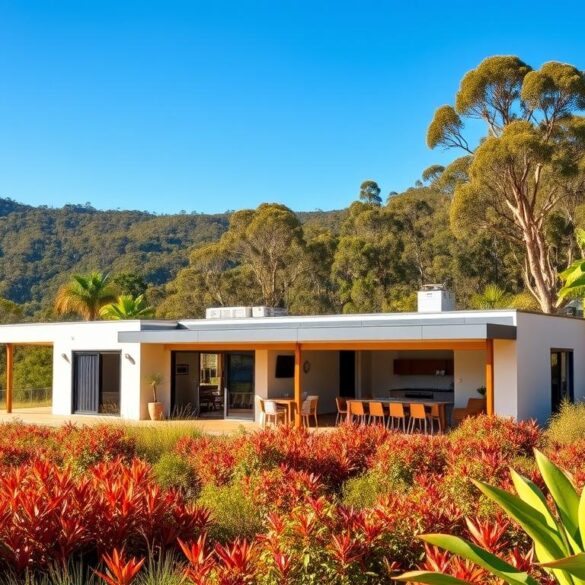The Australian housing market is growing fast. Modular homes are becoming popular because they are affordable and quick to build. Queensland is leading this growth, attracting many builders from around the country.
Prefabricated homes are loved for being affordable and green. Queensland’s growing population and more people moving there are increasing the need for these homes.
Finding the right modular builder can be hard. Homeowners need to look at what each builder offers. We’ll help you understand what to consider when choosing a builder for your home.
Key Takeaways
- Queensland’s booming housing construction sector has attracted significant attention from modular builders, both local and interstate.
- Prefabricated homes offer homeowners an efficient and cost-effective alternative to traditional building methods.
- Evaluating the offerings, services, and cost structures of various modular builders is crucial in making an informed decision.
- Understanding the unique benefits and challenges of Queensland-based and interstate modular builders can help homeowners choose the best fit for their project.
- The article will provide a comprehensive comparison of modular building options to guide homeowners in selecting the right solution for their needs.
Introduction to Modular Building
A new way of building homes is becoming popular – prefab construction. It means building parts of a home in a factory and then putting them together on-site. This method is known as modular buildings. It’s changing the building world with its benefits.
What is Modular Construction?
Modular construction means building parts of a home in a factory. Then, these parts are moved to the building site and put together. This way, homes are built more precisely, saving materials and money. The factory setting also means homes are built faster than traditional building methods.
Benefits of Modular Buildings
- Reduced labor costs: Modular homes are built in factories, saving on-site labor costs.
- Shorter construction times: Most of the work is done in a factory, so homes are built quicker.
- Minimized material waste: Factory building means less waste, making homes more sustainable.
- Cost-effectiveness: Modular homes are cheaper to build because of the efficient process.
- Customization options: Modular designs let homeowners choose what they want, making homes personal.
Modular construction is becoming more popular for its efficiency and sustainability. It’s changing how we build homes, making them better and more affordable. This new way of building is leading to a greener and more cost-effective future.

Overview of Queensland Modular Builders
Queensland’s construction industry is booming. Modular home builders are leading the way with prefab homes. These Queensland modular builders offer unique designs and green building methods. They attract both homeowners and developers.
Key Players in the Queensland Market
Top Queensland modular builders include Prebuilt, Plunkett Homes, and Modular WA. They are known for quality and customization. Their focus on quick builds and energy savings is a big plus.
Services Offered by Queensland Builders
The Queensland modular builders provide many services. They help with design, project management, and installation. They also offer ongoing support. This lets homeowners create their perfect prefab home within their budget.
| Company | Specialties | Key Projects |
|---|---|---|
| Prebuilt | Modular homes, commercial buildings, multi-unit developments | Luxury modular homes, sustainable community projects |
| Plunkett Homes | Prefab homes, custom design, energy-efficient solutions | Affordable modular housing, net-zero emission homes |
| Modular WA | Relocatable and transportable buildings, modular construction | Remote workforce accommodation, disaster relief housing |
As demand for new housing grows in Queensland, these modular builders are ready. They meet the needs of homeowners and developers across the state.

Interstate Modular Builders: An Overview
Queensland has a big modular home industry. But, the Australian prefabricated home market goes beyond state borders. Interstate modular builders work in different states. They offer many specialties and design choices to homeowners.
Major Interstate Companies
Burbank is a company from Victoria that now works in Queensland, New South Wales, and South Australia. Burbank’s growth shows how interstate builders can grow and innovate. They bring new designs to different markets.
Specialties of Interstate Builders
- Interstate builders mix different regional styles into their designs. For example, they use Queensland’s Hamptons and Miami looks in other states.
- Companies like Burbank focus on green and energy-saving homes. This meets the growing demand for eco-friendly modular homes.
- Some builders specialize in luxury homes. They meet the needs of many customers with different budgets across the country.
Interstate modular builders are great for those wanting unique, innovative, and green homes. They offer solutions beyond local markets.
| Interstate Modular Builder | Specialties | Regions Served |
|---|---|---|
| Burbank | Sustainable, energy-efficient construction, Hamptons and Miami-inspired designs | Queensland, New South Wales, Victoria, South Australia |
| Prebuilt | Luxury modular homes, custom design options | New South Wales, Victoria, Queensland |
| Eden Brae Homes | Affordable modular homes, family-friendly designs | New South Wales, Victoria |

“The growth of interstate modular builders like Burbank shows their potential. They can diversify and bring new designs to various markets across Australia.”
Comparing Costs: Queensland vs. Interstate
Modular home prices differ a lot between Queensland and other states in Australia. The Sustainable Home Magazine report shows a 3-bedroom prefab home costs between AUD 150,000 and AUD 300,000. This includes making, moving, and setting up the home. On the other hand, building a similar house the old way can cost between AUD 300,000 and AUD 600,000, not counting the land.
Price Breakdown for Modular Construction
Choosing a prefab or modular home can save you AUD 200,000 to AUD 250,000. This big savings comes from the quick making process and less need for workers. Plus, these homes often cost less to keep up and use energy, making them even more affordable.
Hidden Costs to Consider
Even though prefab homes start cheaper, there are extra costs to think about. Land prices can be very different, from AUD 150,000 to over AUD 500,000. Also, getting the site ready, hooking up utilities, and council fees can add up.
| Project | Location | Estimated Cost |
|---|---|---|
| North East Link | Melbourne, Victoria | AUD 18 billion |
| I-4 Ultimate Improvement Project | Orlando, Florida | AUD 3.32 billion |
| Loop 202 South Mountain Freeway | Phoenix, Arizona | AUD 2.83 billion |
| I-69 Section 5 | Bloomington to Martinsville, Indiana | AUD 547 million |
| I-4/Selmon Expressway Connector | Tampa, Florida | AUD 979 million |
When looking at modular home prices or prefab home costs Australia, comparing Queensland and other states is key. Knowing what affects the cost helps you choose the best option for your budget and needs.
“The study aims to provide policy recommendations to address the decline in housing affordability in Australia.”
Building Regulations and Standards
Building prefabricated homes in Australia needs strict rules. The National Construction Code (NCC) is key. It ensures new buildings are safe and meet standards.
All building work, like prefab homes, must follow the NCC. This is a must for safety and quality.
Queensland Building Codes
In Queensland, the Queensland Building and Construction Commission (QBCC) Act has rules. These cover things like deposits and contract changes.
Interstate Compliance Requirements
For homes from other states, following local building codes is vital. This includes meeting Australian Standards for structure and materials. It’s about safety and durability.
The 2018 Building Confidence Report showed why following the NCC is important. It talked about problems like structural failures and fires. The report suggested a new system for checking building products.
Following building rules can be hard. But it’s key for safe and lasting prefab homes. Homeowners should know the rules and work with experts. This way, they can be sure their homes are up to standard.
Design Flexibility: What to Expect
Modular home designs offer a lot of customization and flexibility. In Queensland, you can make your prefabricated home your own. This means it fits your unique needs and tastes.
Customization Options in Queensland
Builders in Queensland, like Arkular, give you many choices. Arkular’s homes start with a 2.7m ceiling. You can even make it up to 3m high if you want.
Their modules can be up to 5.0m wide and 16.0m long. You can also make them 18m long and 5.5m wide. This lets you design your home in many ways.
At Arkular, customizing your home is easy. They help you with the design, make sure it’s good, and give you a price. Then, they update the plans for you. This way, you can make your home special while keeping it efficient.
Design Choices with Interstate Builders
Builders from other states, like Archiblox in Victoria, also offer great design options. Archiblox homes are $250-450K cheaper than traditional homes. They take about 12 to 20 weeks to build.
Archiblox has many standard features and options for you to choose. You can pick from different ceiling heights, module sizes, and more. They also have a package with green features. Plus, you can pick from lots of finishes like taps, tiles, and benchtops.
Whether you pick a builder in Queensland or another state, you can make your home special. It will show off your style and meet your needs.
Timelines: Completion Rates and Delays
In Queensland, prefab home delivery times and modular home construction timelines face unique challenges. The state’s construction boom has led to record highs in new builds and renovations. This boom has helped sustain the construction industry.
However, interstate builders may face different timelines. This depends on local conditions and demand in each state.
Average Project Timelines in Queensland
Prefabricated homes are built faster than traditional homes. This means less time and money spent on financing and interim housing. A recent report shows Queensland’s major projects have a $92 billion pipeline value from 2023/24 to 2027/28. Funded projects make up $54.4 billion, a big increase from 2022.
Interstate Completion Practices
While Queensland’s construction thrives, interstate builders face different challenges. Sustainable Home Magazine suggests starting utility coordination one to two weeks before moving in. This ensures services are ready when you arrive.
| Metric | Value |
|---|---|
| Total Pipeline Value (Queensland, 2023/24 to 2027/28) | $92 billion |
| Funded Activity (Queensland, 2023/24 to 2027/28) | $54.4 billion (59% of total) |
| Unfunded Work (Queensland, 2023/24 to 2027/28) | $37.6 billion (41% of total) |
| Recommended Utility Coordination Timeline (Interstate) | 1-2 weeks before move-in |
Knowing the timelines and practices in Queensland and interstate markets helps homebuyers. They can make better choices for their prefab or modular home.
Customer Support and Aftercare
Customer support and aftercare are key in modular home building. In Queensland, prefab home quality and service are top priorities for homeowners. They look for builders who offer the best service.
Quality of Service from Queensland Builders
Queensland’s modular home builders focus on making customers happy. The Queensland Home Warranty Scheme covers many issues. It gives homeowners confidence that problems will be fixed quickly.
The Claims Procedures Manual helps with claims. It makes the process clear and easy. This shows Queensland builders’ commitment to great aftercare.
Interstate Builders’ Client Support
Interstate builders are also improving their service. Companies like Sustainable Home Magazine work closely with clients. They design homes that fit each family’s needs.
These builders keep clients updated at every step. They focus on prefab home quality and modular home customer service. This builds trust and keeps customers coming back.
“The ability to adapt to changing market conditions and meet diverse customer needs is essential for both Queensland and interstate builders to maintain their competitive edge and customer loyalty.”
Good customer support and aftercare are crucial. Whether in Queensland or elsewhere, it’s important for homeowners to consider these factors when choosing a builder.
Conclusion: Making the Right Choice
Choosing between Queensland and interstate modular builders is a big decision. It depends on your needs, budget, and where you want your home. Both options have good points, so think them over well.
Factors Influencing Your Decision
Cost is a big factor. Prefab homes can save a lot of money compared to building from scratch. Queensland might be cheaper, with prefab 3-bedroom homes costing between AUD 150,000 and AUD 300,000.
Building a prefab home can save you AUD 200,000 to AUD 250,000. This is a lot compared to traditional building.
Final Thoughts on Modular Building Options
The demand for prefab homes in Australia is rising. It’s important to know the latest in the industry. Whether you pick a Queensland or interstate builder, think about design, time, and customer support.
By looking at all your options, you can choose the best for you. This will lead to your dream prefab home.
FAQ
Q: What is the cost difference between a prefabricated home and a traditional home in Australia?
A: A 3-bedroom prefabricated home in Australia costs between AUD 150,000 and AUD 300,000. This includes making, moving, and putting it together. Traditional homes for the same size cost more, from AUD 300,000 to AUD 600,000, without land costs. Prefab homes save about AUD 200,000 to AUD 250,000 compared to traditional homes.
Q: What are the key benefits of modular construction?
A: Modular construction saves on labor costs and builds homes faster. It also reduces waste. Prefab homes are quicker to build, saving on financing and temporary housing costs. They are built in controlled factories, ensuring less waste and cost surprises.
Modular homes are a cost-effective, green, and efficient choice. They are better than traditional building methods.
Q: How do Queensland and interstate modular builders differ in terms of design flexibility?
A: Builders like Burbank in Queensland offer custom floor plans. Customers can pick from standard plans or suggest changes. These are then priced and checked for feasibility. This way, homes can be personalized while keeping to building standards.
Both Queensland and interstate builders offer different designs. Interstate builders might bring unique styles from other regions.
Q: What are the key compliance requirements for prefabricated homes in Australia?
A: Prefab homes must meet the National Construction Code (NCC). This ensures safety, health, and sustainability. They also need to follow Australian Standards, like AS 1170 for structural design and AS 1684 for timber frames. Following these rules is a must for all buildings in Australia.
Q: How do the construction timelines compare between Queensland and interstate modular builders?
A: Prefab homes are built faster than traditional ones. This saves on financing and temporary housing costs. But, timelines can vary based on local conditions and demand.
Queensland focuses on quick and efficient building. Interstate builders might face different challenges based on their region.
Q: What factors should I consider when choosing between Queensland and interstate modular builders?
A: When picking between Queensland and interstate builders, think about cost, design options, and how fast they build. Also, consider if they follow local rules. Your choice should match your needs, budget, and where you want to live.
Both Queensland and interstate builders have their own strengths. Keeping up with industry changes helps make a good choice.

